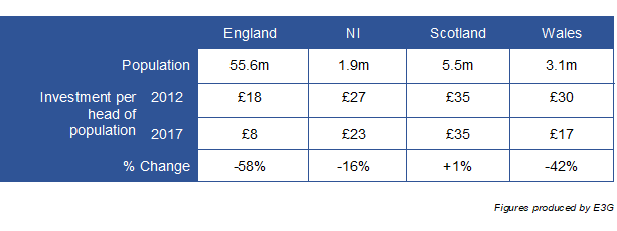Most people would agree that focusing on making our homes more energy efficient would in turn reduce demand and costs. However, an independent climate change organisation that advises the government on climate change has reported that, since 2012:
- the rate of expenditure on home insulation across the UK has fallen by 90%
- energy efficiency public funding has been reduced by 58% in England
According to the report, funding has been reduced in all UK countries except Scotland. Per head of population, Wales now spends twice that of England on home energy efficiency improvements, Northern Ireland three times, and Wales twice as much.
 Over the last twenty years, government help towards energy efficiency improvements have been supported by grants under energy efficiency supplier obligation programmes. This funding is now changing, to provide funding for targeted households that have been identified as ‘at risk of fuel poverty’.
Over the last twenty years, government help towards energy efficiency improvements have been supported by grants under energy efficiency supplier obligation programmes. This funding is now changing, to provide funding for targeted households that have been identified as ‘at risk of fuel poverty’.
A study by National Energy Action (NEA) and climate change campaigner, E3G, compared the number of fatalities across 30 European countries between December and March with the four months before and after. Taking into account only the colder countries of Europe, the study showed that England had the second worst record of cold weather-related deaths. Ireland had the worst record.
In the UK, 168,000 excess winter deaths have been recorded over the last five years. The numbers attributed to fuel poverty and living in a cold home were comparable to the number of deaths from prostate or breast cancer.
David Cameron’s government has been criticised for what he called cutting ‘the green crap’, as an attempt to reduce energy bills. This ended all taxpayer-funded home energy efficiency programmes in England, as well as halving the UK-wide obligation on energy suppliers to delivery energy efficiency improvements.
E3G has said the cuts were a ‘massive mistake’, and that the savings brought about by the cuts were soon nullified by the resultant energy price increases, while the programme itself was ‘cut back to the bone’. The organisation has called for a return to the focus of making homes more energy efficient – as the most cost-effective means of funding and decarbonising energy infrastructure, and to reduce the health problems associated with cold homes.
The Warm Home Discount provides two million low income households with £140 towards their winter energy bills. However, a study by Age UK in 2012 estimated that the cost of cold homes to the NHS was £1.36 billion every year. Campaigners are calling for a reinstatement of public capital investment to make homes more energy efficient and reduce the impact of fuel poverty and cold home-related illnesses.
The NEA/E3G report detailed a number of additional benefits:
- helping the UK meet its carbon-reduction targets
- improving air quality
- reducing the UK’s reliance on foreign gas imports
- creating a healthier workforce
- supporting the energy-efficiency industry
SH/LB

